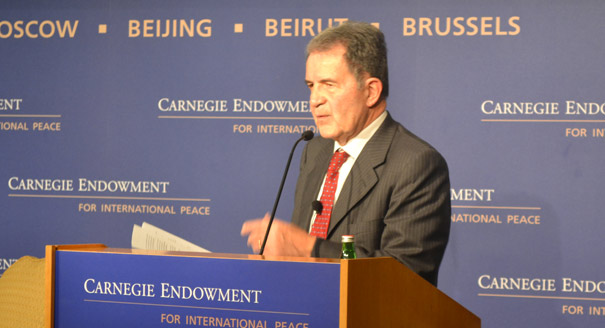Registration
Thank you!
You will receive an email confirming your registration.
To conclude his visit to Washington, Romano Prodi visited the Carnegie Endowment to discuss the future of the Eastern Partnership. In November, the EU will convene a landmark summit of the Eastern Partnership, bringing together European heads of state with leaders of the six Eastern Partnership countries: Ukraine, Moldova, Belarus, Georgia, Azerbaijan, and Armenia. As president of the European Commission from 1999 to 2004, Prodi oversaw a key stage of the EU’s eastward expansion. He spoke about the added complexity of further expansion, prospects for EU-Russia cooperation, and the euro crisis.
EU Enlargement
- Successful Expansion: Prodi deemed the EU’s expansion to eight countries of the former Eastern bloc in 2004 “a great job,” which exceeded all expectations. Conceding that members have not always respected the rules, he speculated that the current economic crisis would have been much harder felt by the new members had they been outside the union.
- Ukrainian Prospective Membership: Prodi commented on Russia’s “strong reaction” to the prospect of Ukraine becoming an EU member. Adding that Ukraine was heavily polarized, he concluded that it had been wise to cap the enlargement at ten states in 2004.
- Eurozone: Prodi was confident that the worst of the euro crisis has passed, and that despite the criticism and significant challenges in the near term, the currency will be gradually adopted by more states.
The Eastern Partnership
- Enhancing Relations: Prodi was keen to highlight the potential for EU-Ukraine “quality” trade despite Russian domination of the energy and raw materials markets. This applies to the rest of the Eastern Partnership, he added.
- Sanctions: Prodi commended his successors’ decision not to impose sanctions on the Ukrainian leadership. In Prodi’s opinion, sanctions seem to affect the weakest and not the powerful and ultimately would “push Ukrainian voters and Ukraine’s government into the arms of Russia.”
- EU-Russia Relations: EU-Russia relations may ultimately benefit from the Eastern Partnership, Prodi argued, if the two sides manage to conduct their affairs with the six countries without making cooperation a zero-sum game.
